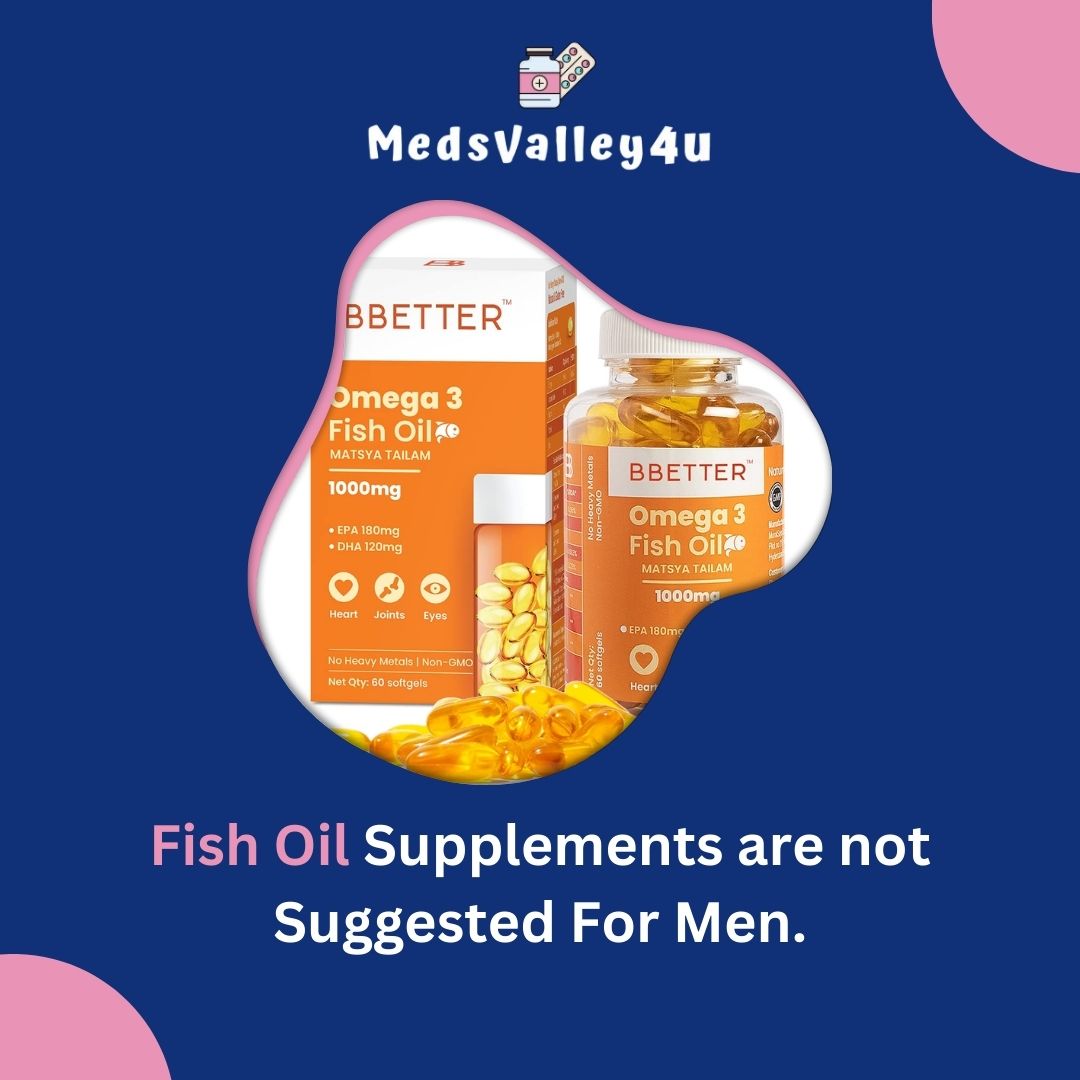Why Fish Oil Supplements May Not Be Suggested for Men
Fish oil supplements, which are rich in omega-3 fatty acids, have been popular for their potential health benefits, including reducing inflammation, supporting heart health, and improving brain function. However, recent studies and health guidelines have raised concerns about the routine use of fish oil supplements for certain populations, including men. Here’s a detailed explanation of why fish oil supplements might not be recommended for men:
1. Conflicting Evidence on Cardiovascular Benefits
- Initial Hopes: Early studies suggested that omega-3 fatty acids from fish oil could significantly reduce the risk of cardiovascular diseases (CVD), such as heart attacks and strokes, leading to widespread use of fish oil supplements.
- Recent Research: More recent, large-scale clinical trials have shown mixed results. Some studies have found little to no significant reduction in cardiovascular events from taking fish oil supplements, especially in populations already following a healthy diet. In some cases, benefits were only observed at high doses or in specific subgroups, such as people with high triglycerides.
2. Risk of Prostate Cancer
- Prostate Cancer Concerns: Some studies have raised concerns about a potential link between high levels of omega-3 fatty acids and an increased risk of prostate cancer. A study published in the Journal of the National Cancer Institute found that men with higher blood levels of omega-3s had an increased risk of developing high-grade prostate cancer.
- Controversy and Debate: This finding has sparked debate, with some experts questioning the study’s methodology and others suggesting that the results may not apply to the general population. However, it has led to caution in recommending high doses of fish oil supplements for men, especially those at risk for prostate cancer.
3. Nutrient Overload and Imbalance
- Potential Imbalance: Excessive intake of omega-3 fatty acids through supplements can lead to an imbalance with other essential fatty acids, such as omega-6s, which are also important for health. A proper balance between omega-3 and omega-6 fatty acids is crucial for maintaining inflammation levels and overall health.
- Nutrient Overload: High doses of fish oil supplements can also lead to nutrient overload, which may cause side effects such as bleeding disorders (due to the blood-thinning effect of omega-3s), gastrointestinal issues, or immune system suppression.
4. Quality and Purity Concerns
- Contaminants: Fish oil supplements are derived from fish, which can contain environmental contaminants like mercury, dioxins, and polychlorinated biphenyls (PCBs). Although many supplements are purified, not all products meet stringent quality standards, raising concerns about potential exposure to harmful substances.
- Oxidation: Fish oil is prone to oxidation, which can lead to the formation of harmful free radicals. Oxidized fish oil may lose its beneficial properties and could potentially be harmful. The quality and storage conditions of fish oil supplements are critical to ensuring their safety and efficacy.
5. Dietary Sources vs. Supplements
- Preference for Whole Foods: Many health experts recommend obtaining omega-3 fatty acids from dietary sources, such as fatty fish (salmon, mackerel, sardines), rather than supplements. Whole foods provide a range of nutrients and are less likely to cause the imbalances or side effects associated with high-dose supplements.
- Balanced Diet: A well-balanced diet that includes a variety of nutrient-dense foods is often sufficient to meet omega-3 needs without the need for supplements. Men who consume fish regularly may not need additional supplementation, reducing the potential risks.
6. Specific Health Conditions
- Personalized Advice: While fish oil supplements may not be broadly recommended for all men, they could be beneficial for certain individuals with specific health conditions, such as high triglycerides, inflammatory disorders, or those who do not consume fish regularly. In these cases, supplements should be taken under medical supervision to balance benefits and risks.
- Alternative Omega-3 Sources: For men concerned about the risks associated with fish oil, plant-based omega-3 sources like flaxseed, chia seeds, and walnuts may be considered. These sources provide alpha-linolenic acid (ALA), which the body can convert to other omega-3s, though the conversion rate is low.
Here are some frequently asked questions (FAQs):
1. Why might it not be recommended for men?
- Answer: It may not be recommended for men due to mixed evidence on their cardiovascular benefits, potential links to an increased risk of prostate cancer, concerns about nutrient imbalance, and the possibility of consuming contaminants like mercury.
2. Is there a link between fish oil supplements and prostate cancer?
- Answer: Some studies have suggested a potential link between high levels of omega-3 fatty acids from fish oil and an increased risk of high-grade prostate cancer. This finding is controversial and not universally accepted, but it has led to caution in recommending fish oil supplements for men, particularly those at higher risk for prostate cancer.
3. Do it provide heart health benefits for men?
- Answer: The evidence is mixed. While early studies suggested that fish oil could reduce the risk of heart disease, more recent research has shown little to no significant benefit for cardiovascular health in men who are otherwise healthy or already follow a heart-healthy diet.
4. Can taking too much it be harmful?
- Answer: Yes, excessive intake of it can lead to nutrient imbalances, increased risk of bleeding, gastrointestinal issues, and immune system suppression. It’s important to follow recommended dosages and consult with a healthcare provider before taking high doses of fish oil.
5. Are there safer alternatives to it for men?
- Answer: Men can obtain omega-3 fatty acids from dietary sources such as fatty fish (salmon, mackerel, and sardines) or plant-based sources like flaxseed, chia seeds, and walnuts. These alternatives can provide the necessary omega-3s without the risks associated with high-dose supplements.
6. Should men avoid all omega-3 supplements?
- Answer: Not necessarily. Omega-3 supplements, including it may still be beneficial for men with specific health conditions, such as high triglycerides or inflammatory disorders. However, they should be taken under medical supervision to ensure safety and effectiveness.
7. What are the risks of taking low-quality it?
- Answer: Low-quality it may contain contaminants like mercury, dioxins, and PCBs, which can be harmful to health. Additionally, fish oil can oxidize, leading to the formation of harmful free radicals. It’s important to choose high-quality, third-party-tested supplements if opting to take fish oil.
8. How much it is safe for men to take?
- Answer: The safe dosage of it varies depending on individual health needs. Generally, a common dosage is 1,000 mg per day, but higher doses may be recommended for specific conditions under medical supervision. Men should consult with a healthcare provider to determine the appropriate dosage.
9. Can it interact with other medications?
- Answer: Yes, it can interact with certain medications, particularly blood thinners, and may increase the risk of bleeding. Men taking medications should consult with their healthcare provider before starting fish oil supplements.
10. What are the signs of taking too much fish oil?
- Answer: Signs of taking too much it may include easy bruising, nosebleeds, gastrointestinal discomfort, a fishy aftertaste, and a potential increase in LDL cholesterol. If you experience any of these symptoms, it’s important to reduce your dosage and consult a healthcare provider.
11. Is it better to get omega-3s from food rather than supplements?
- Answer: Yes, many experts recommend obtaining omega-3 fatty acids from dietary sources rather than supplements. Foods like fatty fish, flaxseeds, and walnuts provide a range of nutrients and are less likely to cause the imbalances or side effects associated with high-dose supplements.
12. Who should consider taking fish oil supplements?
- Answer: It may be beneficial for men with specific health conditions, such as high triglycerides, inflammatory disorders, or those who do not consume fish regularly. However, they should only be taken under the guidance of a healthcare provider.
13. What should men do before starting fish oil supplements?
- Answer: Men should consult with a healthcare provider before starting it. The provider can assess their individual health needs, discuss potential risks and benefits, and recommend an appropriate dosage or alternative options.
Similar Posts:-
Which Medicines Are Effective for Treating Erectile Dysfunction?
The Primary Six Causes Of Male Erectile Dysfunction
What Women Feel And Think About Sexual Desire?
Is Erectile Dysfunction Associated With Heart And Blood Vessel Disease?
The Top 10 Male Advantages Of Almonds And Walnuts
Are Pineapples Safe For Diabetes Patients to Eat?
What Are the Effects of Tadalafil on Kidneys?
Can Having Sex After a Heart Attack Be Harmful?
Fenugreek: Does It Help In Libido? Studying its Value
Multivitamins Can Improve Men’s Health.
Conclusion:
- Individualized Recommendations: The decision to take it supplements should be individualized, taking into account a person’s overall diet, health status, risk factors, and lifestyle. Men should consult with a healthcare provider to assess whether fish oil supplements are appropriate for their specific needs.
- Caution and Moderation: While fish oil supplements can offer benefits for certain health conditions, the potential risks, particularly regarding prostate cancer and nutrient imbalances, warrant caution. It’s important to use these supplements in moderation and focus on a balanced diet as the foundation for good health.







Write a comment
Your email address will not be published. All fields are required